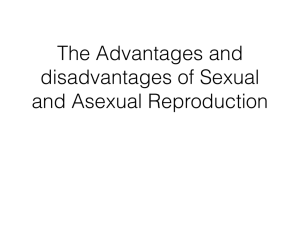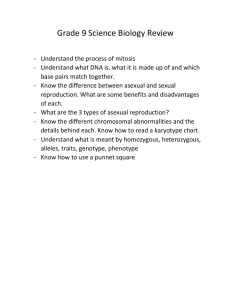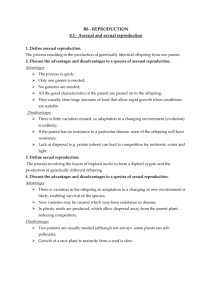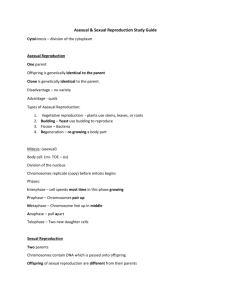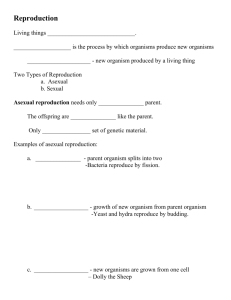Notes: Sexual and Asexual Reproduction
advertisement
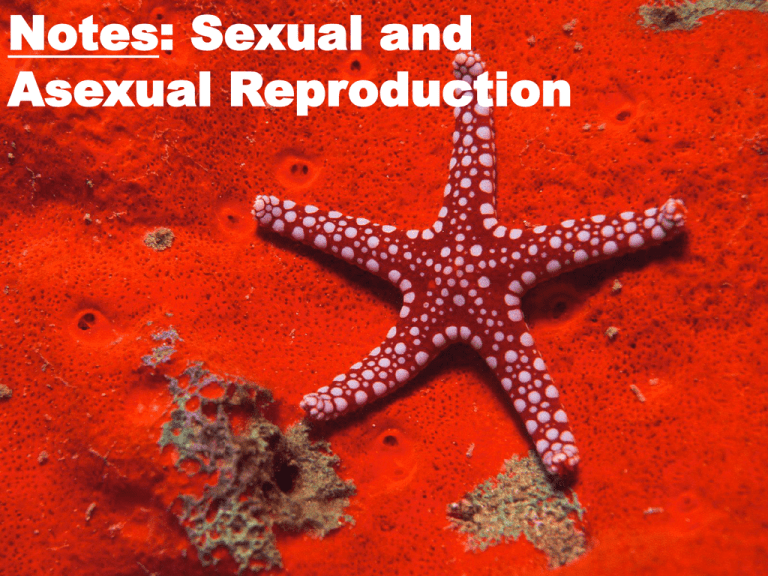
Notes: Sexual and Asexual Reproduction Sexual Reproduction – process in which 2 parents contribute genes (via sperm and egg) to form a new individual The resulting individual will be a combination of the male and female parents. This combination of genes creates an entirely unique individual unlike any other. Sexual Reproduction – Requires two sex cells – egg and sperm The egg and sperm join to form an entirely new organism (called a zygote) Different from the parent organism Offspring has half of the Mother’s DNA and half of the Father’s DNA Benefits of Sexual Reproduction • Genetic differences help a species survive adverse conditions like disease and environmental changes. If individuals have variation, some of them may have a gene that helps them survive when others do not. Downsides of Sexual Reproduction • Sexual Reproduction requires two individuals: It takes valuable time and energy to find or compete for a mate • Sexual reproduction takes a while – depending on the size of the organism it can take a long period of time for the offspring to grow enough to be born. Ex: for humans it takes 266 days to reach full term and elephants take 624 days. (This is called a gestation period) Downsides of Sexual Reproduction • Offspring of sexually reproducing organisms usually require time for care from the parents after birth as well. There is time needed between litters. • Organisms that reproduce sexually usually have offspring that develop inside the mother. This limits the amount of offspring one can have at a time. Asexual Reproduction – reproduction involving only one parent organism. The offspring created through asexual reproduction have the exact same genetic material as the parent; the offspring is a CLONE of its parent. Benefits of Asexual Reproduction • There is no energy or time required to find a mate. • The production of offspring is usually external so the parent can have LOTS of offspring in a very short amount of time. • There is no parental care required; since the offspring are copies of the parent there is no “baby” stage Downsides of Asexual Reproduction • Offspring of asexually reproducing organisms are identical to their parents. All members of the species are identical to one another. If a disease or change in environment occurs, all individuals will be affected. Types of Asexual Reproduction: Binary fission - one single cell copies itself and splits in two, creating a new individual. **This is how BACTERIA reproduce** Binary Fission in Bacteria Types of Asexual Reproduction: Budding- an offspring grows out of the body of the parent and then breaks off. **The offspring organism is smaller than the parent. The buds grow into fully matured individuals which eventually break away from the parent organism.** Hydra is an Animal that Reproduces through Budding Types of Asexual Reproduction: Vegetative Reproduction- process by which new plant "individuals" arise or are obtained without production of seeds or spores ***Examples are the runners of strawberries, the tubers of potatoes, and the bulbs of onions***. Types of Asexual Reproduction: Regeneration- if a piece of a parent is detached, it can grow and develop into a completely new individual. **This is how STARFISH reproduce**
